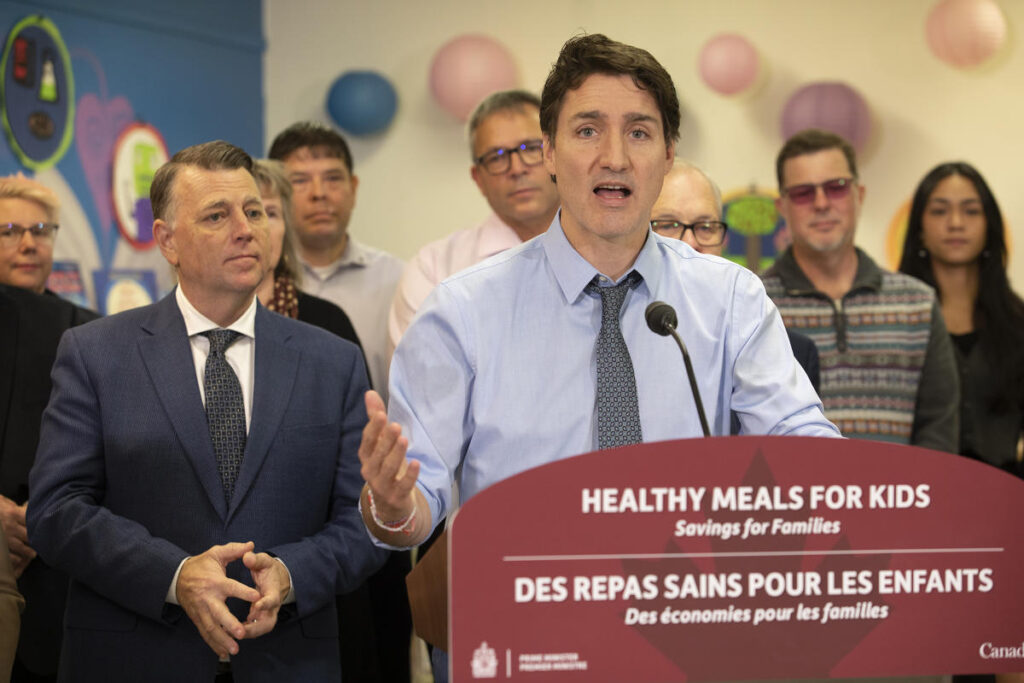Canadian Prime Minister Justin Trudeau expressed concern over President-elect Donald Trump’s potential implementation of hefty tariffs on Canadian goods, asserting that such measures would ultimately harm American consumers and businesses as well. Trump has vocalized a commitment to impose a 25% tax on all products from Canada and Mexico as a means of addressing what he claims is the flow of drugs and migrants across borders. Trudeau’s statements reflect an understanding that Trump’s threats are likely to be acted upon. He emphasized that the imposition of tariffs would not only hurt Canadian workers and industries but would also lead to increased prices for American citizens, thus contradicting Trump’s promises to reduce grocery costs.
Trudeau pointed out the significant interdependence between the U.S. and Canadian economies, highlighting how tariffs could undermine the recently renegotiated North American trade pact. He noted that the new agreement was designed to be mutually beneficial, allowing both countries to collaborate effectively. Trudeau indicated that Canada remains open to constructive dialogue with Trump, aiming to address concerns while maintaining a forward-moving partnership. He expressed confidence in the potential for negotiations to mitigate the repercussions of tariffs, citing the necessity for ongoing discussions with Trump to steer both nations toward beneficial outcomes.
In his criticisms, Trump’s focus on illegal immigration has drawn scrutiny, particularly since the volume of migrants crossing the Canadian border remains relatively low compared to the influx at the southern border with Mexico. The U.S. Border Patrol’s data showed stark contrasts in arrest numbers at these borders, with far more apprehensions occurring at the Mexican border. Additionally, while Trump has raised alarm about fentanyl trafficking from both Canada and Mexico, statistics reveal that seizures at the Canadian border are significantly less concerning than those from Mexico, illustrating the disproportionate nature of Trump’s border security rhetoric.
In response to potential tariffs, Canadian officials have been proactive in considering appropriate retaliatory measures and assert that decisions regarding these measures will be made judiciously. Internal discussions have commenced around identifying specific U.S. products that could be targeted if Trump proceeds with his tariff implementation. The aim is to prepare for all possible outcomes in what could evolve into a broader trade conflict similar to the one seen during Trump’s first term, when retaliatory tariffs became commonplace in the wake of U.S. tariff increases on Canadian steel and aluminum.
Within the U.S., business organizations have expressed alarm regarding the implications of escalated tariffs on inflation and consumer prices. Democratic lawmakers are considering measures to limit presidential authority over the imposition of such tariffs, citing potential adverse effects on a range of products, from vehicles to groceries. With Canada being the top export market for numerous U.S. states and a major supplier of essential commodities—in particular crude oil and electricity—stakeholders are increasingly concerned about the economic ramifications of a trade war. Approximately $3.6 billion in goods and services cross the border daily, underlining the depth of economic ties between the two nations.
Experts note that Canada’s vulnerability in this scenario stems from its reliance on trade, as exports to the U.S. comprise a significant portion of its economy. Given Trump’s impulsive tendencies and media influences, particularly from outlets like Fox News, there’s apprehension that decisions may be made without fully considering long-term impacts. Trudeau’s government remains vigilant and prepared to respond to any shifts in trade policy, recognizing the intricate interconnectedness of the Canadian and U.S. economies that make such disputes consequential for both countries.

